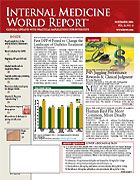Publication
Article
Simple Questionnaire Allows Self-Screening for Early Dementia
Author(s):
From the International Conference on Alzheimer?s Disease
MADRID, Spain—A brief questionnaire (called AD8) that patients can complete in the physician’s waiting room can help identify those in need of increased scrutiny for early dementia, according to results of a study presented at the International Conference on Alzheimer’s Disease and Related Disorders.
The questionnaire, developed by James E. Galvin, MD, MSc, and colleagues at Washington University School of Medicine in St. Louis, can detect dementia based on responses collected from the patient’s so-called “informant,” namely, spouse, adult children, relatives, or friends. (This questionnaire was also discussed in an article published in Neurology. 2005; 65:559-564).
“We have shown that the AD8 is a good self-rating tool for detecting cognitive changes resulting from dementia,” said Dr Galvin. “Knowing that older adults can rate their own mild cognitive impairment is important, because patients often go to doctors’ offices unaccompanied.” The study was conducted to determine how the AD8 stacked up as a self-rating tool when compared with informant and clinician impressions of cognitive status.
Overall, some 325 patients and their informants completed the questionnaire separately. Participants were instructed to answer “yes,” “no,” or “no change” when asked about problems with judgment, less interest in hobbies and activities, or a tendency to repeat questions or statements. The number of AD8 items endorsed by the patient was then compared with the number endorsed by the informant.
A total of ≥2 positive responses is indicative of dementia.
Questions focused on difficulty learning how to use new tools, appliances, or gadgets; forgetting the month or year; having trouble handling financial affairs or remembering appointments; and daily problems with thinking and/or memory.
Informants were able to reliably ascertain changes related to each of the patient’s cognitive abilities, which corresponded significantly with physicians’ assessment of the patient’s cognitive status. The sensitivity of informants’ AD8 rating was 84%, specificity was 93%, and the positive predictive value was 85%. Informants were able to correctly classify the presence of dementia in the patient 90% of the time.
Patients were also able to accurately rate their own cognitive function, which in turn corresponded well with physicians’ assessment of the patient’s cognitive status. Although informants were likely to be more observant, patients who completed the AD8 correctly classified the presence of dementia 74% of the time.
Dr Galvin said that patients who answer yes to ≥2 questions can be referred to a specialist, who will combine the AD8 results with those of objective measures of cognition before making a definitive diagnosis.
Although dementia affects about 10% of those aged >65 years and 50% of those >85 years, it often goes unrecognized, Dr Galvin noted.






